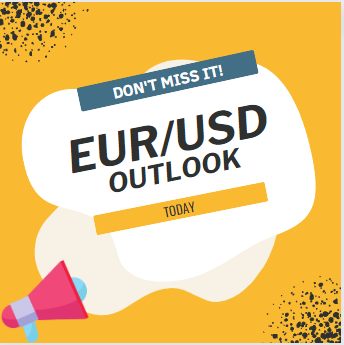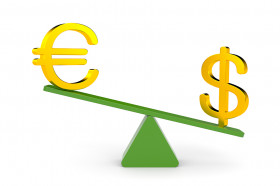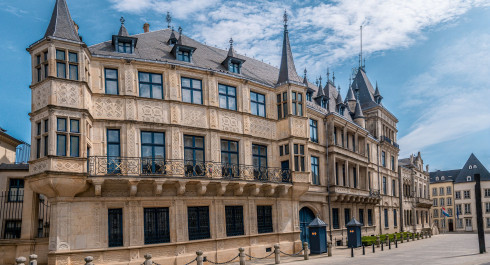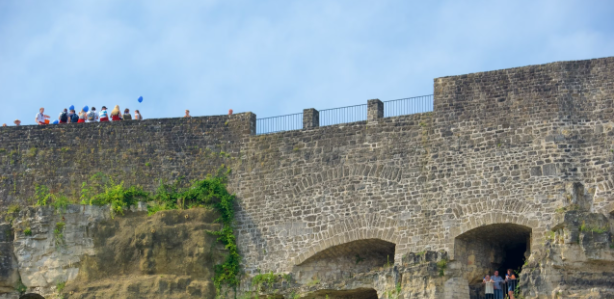EUR/USD Weekly Outlook
EUR/USD fell further to 1.0634 last week but recovered since then. As a temporary top was then formed at 1.0778, initial bias is turned neutral this week first. On the upside, above 1.0778 will resume the rebound from 1.0634 short term bottom to 55 D EMA (now at 1.0829). On the downside, though, break of […]
The post EUR/USD Weekly Outlook appeared first on Action Forex.
Here Are 20 Factors That Can Influence the Euro Exchange Rate:
1. Interest rates: The European Central Bank (ECB) sets interest rates for
the Eurozone. If the ECB raises interest rates, it makes the Euro more
attractive to investors, which can cause the currency to strengthen.
2. Inflation: Inflation rate is the rate at which prices for goods and
services are rising. If inflation is high in the Eurozone, it can make the Euro
less attractive to investors, which can cause the currency to weaken.
3. Economic growth: Economic growth is the rate at which the economy is
expanding. If economic growth is strong in the Eurozone, it can make the Euro
more attractive to investors, which can cause the currency to strengthen.
4. Political stability: Political stability is the degree to which a country is
free from political unrest. If political stability is weak in the Eurozone, it
can make the Euro less attractive to investors, which can cause the currency to
weaken.
5. Trade balance: Economically, the trade balance is the difference between
the actual value of a country's exports and imports. If the Eurozone has a
trade surplus, it means that it is exporting more goods and services than it is
importing. This can make the Euro more attractive to investors, which can cause
the currency to strengthen.
6. Current account balance: In exchange rates, the current account balance is the
difference between a country's exports, imports, income from investments, and
payments on investments. If the Eurozone has a current account surplus, it
means that it is receiving more money from abroad than it is sending out. This
can make the Euro more attractive to investors, which can cause the currency to
strengthen.
7. Government debt: Government debt is the total amount of money that a
government owes. If government debt is high in the Eurozone, it can make the
Euro less attractive to investors, which can cause the currency to weaken.
8. Foreign investment: Foreign investment is the money that investors from other
countries put into the Eurozone. If foreign investment is high, it can make the
Euro more attractive to investors, which can cause the currency to strengthen.
9. Speculation: Speculation is the buying or selling of a currency with
the expectation that the price will change in the future. Speculation can cause
the value of a currency to fluctuate wildly.
10. Investor confidence: Investor confidence is the degree to which investors
believe that the Eurozone is a safe and stable place to invest. If investor
confidence is high, it can make the Euro more attractive to investors, which
can cause the currency to strengthen.
11. Geopolitical events: Globally, geopolitical events, such as wars, terrorist
attacks, and natural disasters, can have a significant impact on the value of
currencies.
12. Expectations: Expectations about future economic conditions can also
have an impact on the value of currencies. If investors expect the Eurozone
economy to grow strongly in the future, they may be willing to pay more for
Euros today.
13. Supply and demand: In an economy, the supply and demand for Euros can also
affect the currency's value. If there are more Euros available for sale than
there are buyers, the currency will likely weaken.
14. Technical factors: Technical factors, such as chart patterns and trading
volumes, can also play a role in determining the value of a currency.
15. Central bank intervention: Central banks can intervene in the
foreign exchange market to buy or sell currencies in order to influence the
currency's value.
16. Hedge funds: In finance and forex exchange, Hedge funds are investment
vehicles that use complex financial instruments to try to profit from changes
in the value of currencies.
17. Retail investors: In an economy, retail investors are individual investors
who trade currencies for their own personal accounts.
18. Institutional investors: Institutional investors are large organizations, such as
pension funds and insurance companies, that invest money on behalf of their
clients.
19. Market makers: Market makers are dealers who buy and sell currencies on
the open market.
20. Traders: Traders are individuals who buy and sell currencies for
profit.
In exchange rates, it is
important to note that these are just some of the factors that can influence
the strength of the Euro. The actual value of the currency will be determined
by a complex interaction of all of these factors.
Here Are 5 Top Factors That Determine the Value of the Euro:
- Inflation: If inflation is higher in
the Eurozone than in other countries, the value of the Euro will tend to
fall. This is because investors will be less likely to want to hold Euros,
as they will lose value over time.
- Interest rates: If interest rates in the
Eurozone are higher than in other countries, the value of the Euro will
tend to rise. This is because investors will be more likely to want to
invest in Euros, as they will earn a higher return.
- Economic growth: If the Eurozone economy
is growing faster than other economies, the value of the Euro will tend to
rise. This is because investors will be more likely to want to invest in
Euro-denominated assets, as they expect to earn a higher return.
- Political stability: If the Eurozone is
politically stable, the value of the Euro will tend to rise. This is
because investors will be more likely to want to invest in
Euro-denominated assets, as they will be less worried about political
risk.
- Speculation: Speculation can also have a significant impact on the value of the Euro. If investors believe that the Euro is going to appreciate in value, they will buy Euros, which will push up the value of the Euro. Conversely, if investors believe that the Euro is going to depreciate in value, they will sell Euros, which will push down the value of the Euro.
10 Issues That Can Affect the Exchange Rate in Luxembourg:
1. Inflation: If inflation is higher in Luxembourg than in other
countries, the value of the Luxembourgish franc (EUR) will tend to fall. This
is because investors will be less likely to want to hold EUR, as they will lose
value over time.
2. Interest rates: If interest rates in Luxembourg are higher than in other
countries, the value of the EUR will tend to rise. This is because investors
will be more likely to want to invest in EUR, as they will earn a higher
return.
3. Economic growth: If the Luxembourg economy is growing faster than other
economies, the value of the EUR will tend to rise. This is because investors
will be more likely to want to invest in EUR-denominated assets, as they expect
to earn a higher return.
4. Political stability: If Luxembourg is politically stable, the value of the EUR
will tend to rise. This is because investors will be more likely to want to
invest in EUR-denominated assets, as they will be less worried about political
risk.
5. Speculation: Speculation can also have a significant impact on the
value of the EUR. If investors believe that the EUR is going to appreciate in
value, they will buy EUR, which will push up the value of the EUR. Conversely,
if investors believe that the EUR is going to depreciate in value, they will
sell EUR, which will push down the value of the EUR.
6. Changes in oil prices: Oil is a major export for Luxembourg, so changes in oil
prices can have a massive influence on the value of the EUR. If oil prices
rise, it will make it more expensive for Luxembourg to import goods and
services, which will lead to inflation and a weaker EUR. Conversely, if oil
prices fall, it will make it cheaper for Luxembourg to import goods and
services, which will lead to deflation and a stronger EUR.
7. Changes in stock markets: Luxembourg has a large financial sector, so changes in
stock markets can have a noteworthy impact on the value of the EUR. If stock
markets rise, it will make Luxembourg a more attractive place to invest, which
will lead to a stronger EUR. Conversely, if stock markets fall, it will make
Luxembourg a less attractive place to invest, which will lead to a weaker EUR.
8. Changes in natural disasters: Natural disasters can have a significant
effect on the value of the EUR. If a natural disaster occurs in Luxembourg, it
will damage the economy and lead to a weaker EUR. Conversely, if a natural
disaster occurs in another country, it could lead to increased demand for EUR
as investors seek a safe haven currency.
9. Geopolitical events: In the contemporary world, geopolitical events, such as pandemics,
wars or terrorist attacks, can have a substantial impact on the face value of
the EUR. If a geopolitical event occurs that raises concerns about the
stability of the global economy, it could lead to a sell-off of EUR and a
weaker currency. Conversely, if a geopolitical event occurs that improves
confidence in the global economy, it could lead to a rally in EUR and a
stronger currency.
10. Central bank policies: The policies of the European Central Bank (ECB) can have a
significant impact on the value of the EUR. If the ECB raises interest rates,
it will make it more expensive for businesses and consumers to borrow money or
take loans, which could lead to a recession and a weaker EUR. Conversely, if
the ECB lowers interest rates, it will make it cheaper for businesses and
consumers to borrow money, which could lead to economic growth and a stronger
EUR.
In exchange rate, other
critical factors to consider include changes in the value of the US dollar, the
Japanese yen, and the British pound.
10 Insurance Purchase Practices for Travelers in Luxembourg:
- Compare policies and prices
from different insurers. In Luxembourg, there are many different travel
insurance policies available to choose from, so it is important to compare
them before you buy. As a traveler, make sure to compare the coverage
limits, deductibles, and exclusions of each policy.
- Read the fine print. Before you buy any travel
insurance policy, be sure to read the fine print. This includes the terms
and conditions, as well as the exclusions. You don't want to be surprised
by any hidden fees or limitations.
- Make sure your policy covers
all of your activities. If you're planning on doing anything adventurous
while you're in Luxembourg, make sure your travel insurance policy covers
it. This includes activities like hiking, skiing, and scuba diving.
- Consider purchasing
cancellation insurance. Cancellation insurance can help you recoup some
of your travel expenses if you have to cancel your trip for any reason.
This approach can be a lifesaver if you have to cancel your trip or stay
in in Luxembourg due to a
medical emergency or a family emergency.
- Consider purchasing medical
evacuation insurance. Medical
evacuation insurance can help you pay for the cost of being medically
evacuated from Luxembourg if you become seriously ill or injured. This can
be a very expensive expense, so it's important to have insurance that will
cover it.
- Make sure your policy has a
24/7 customer service line. If you do have to file a claim, you'll want to be
able to do it quickly and easily. Make sure your travel insurance policy
has a 24/7 customer service line so you can get help if you need it.
- Buy your travel insurance in
advance. As
a traveler, do not wait until the last minute to buy your travel
insurance. The closer you get to your trip to Luxembourg, the more expensive the policies will be.
- Keep your travel insurance
information in a safe place. Ensure you have a copy of your travel insurance
policy and your contact information for your insurance company. This way,
you can easily find it if you need to file a claim.
- Be aware of the local laws. When you're traveling to
a new country, it's important to be aware of the local laws. This includes
laws about alcohol consumption, drugs, and driving.
- Have fun! Travel insurance can help you protect yourself from financial loss, but it shouldn't stop you from having fun. Just be sure to do your research and buy a policy that meets your needs.
Bucket List Things to Do in Luxembourg
1. Visit the Grand Ducal Palace: This is the official residence and dwelling of the Grand Duke of Luxembourg and is a beautiful example of Baroque architecture.
2. Explore the Bock Casemates: These are a series of underground tunnels and galleries that were used as a military defense system in the 17th century.
3. Take a walk along the Chemin de la Corniche: This is a scenic walkway that offers stunning views of the city of Luxembourg.
4. Visit the Luxembourg City History Museum: This museum tells the
story of Luxembourg City from its early beginnings to the present day.
5. Go hiking in the Mullerthal region: This region is known
for its beautiful hiking trails and its dramatic landscapes.
6. Visit the Vianden Castle: This is a medieval castle that is perched on a hilltop
overlooking the town of Vianden.
7. Take a boat trip on the Moselle River: This river flows
through the heart of Luxembourg and offers stunning scenery.
Visit the Grand Ducal Palace
The Grand Ducal Palace
is a beautiful and historic building located in the heart of Luxembourg City.
It is the official residence of the Grand Duke of Luxembourg and his family,
and is open to the public for tours.
The palace was built
in the 16th century and has been expanded, reconditioned, and renovated several
times over the years. It is a mix of architectural styles, including
Renaissance, Baroque, and Neoclassical. The interior of the palace is richly
decorated with paintings, sculptures, and tapestries.
The palace is open for
tours from July to September. Tours last for about an hour and a half and
include a visit to the State Apartments, the Throne Room, and the Grand Duke's
private apartments.
As a Traveler to Luxembourg: Here are some of the things you can see and
do during your visit to the Grand Ducal Palace:
- Visit the State Apartments: These rooms are used for
official events, such as state receptions and banquets.
- Visit the State Apartments: These rooms are used for
official events, such as state receptions and banquets.
- Visit the State Apartments: These rooms are used for
official events, such as state receptions and banquets.
- Visit the State Apartments: These rooms are used for
official events, such as state receptions and banquets.
Explore the Bock Casemates:
The Bock Casemates are
a vast network of underground tunnels and galleries that were built in the 17th
century to defend the city of Luxembourg. They are located on the Bock
Promontory, which is a steep cliff overlooking the Pétrusse Valley. The
casemates were used as a military base for centuries, and they played an
important role in the city's defense during the French Revolutionary Wars, the
Napoleonic Wars, and World War II.
Today, the Bock
Casemates are a popular tourist attraction. Visitors can explore the tunnels
and galleries on guided tours, and they can also enjoy stunning views of the
city from the casemates' ramparts.
Here are some of the
things you can do when exploring the Bock Casemates:
- Take a guided tour: The best way to learn about
the history of the Bock Casemates is to take a guided tour. Tours are
available in English, French, German, and Luxembourgish.
- Enjoy the views: The Bock Casemates offer
stunning views of the city of Luxembourg. From the ramparts, you can see
the old town, the Petrusse Valley, and the river Alzette.
- Visit the archaeological crypt: The archaeological crypt is
located at the entrance to the Bock Casemates. It contains exhibits and
displays about the history of the site, including artifacts that were
found during excavations.
Overall, The Bock
Casemates are a fascinating place to learn about the history of Luxembourg and
its role as a fortress city. They are also a great place to enjoy stunning
views of the city. Others fun activities can include going for shopping in the
city's many boutiques and department stores. Also, consider sample the local
cuisine, which includes Luxembourgish sausage, Ardennes ham, and cheeses. It is
important to visit one of the city's many museums, such as the National Museum
of History and Art, the Museum of Modern Art, or the Luxembourg City History
Museum.


![Euro Exchange Rate <script async src="https://pagead2.googlesyndication.com/pagead/js/adsbygoogle.js?client=ca-pub-1110068140430433" crossorigin="anonymous"></script> <ins class="adsbygoogle" style="display:block; text-align:center;" data-ad-layout="in-article" data-ad-format="fluid" data-ad-client="ca-pub-1110068140430433" data-ad-slot="7231822172"></ins> <script> (adsbygoogle = window.adsbygoogle || []).push({}); </script>](https://blogger.googleusercontent.com/img/b/R29vZ2xl/AVvXsEi6NJ3CQQCOWovK2LoYepxVms7J2Uf6K5BS3naMgfX8Xg9215yMy14mmESa430hY8McfnFHDsQzFg6RUpitR_OwMzykL6fP0fyKWYo6pZgo_CYjfHq-1LsZlO51YFlZMebL5ePb4a4gP-dqBJq52LNpj44nAAtwEGf7-B3jeXMXk1CsBo3AHtYzhz1yqw/s16000/Image%20Three.PNG)










